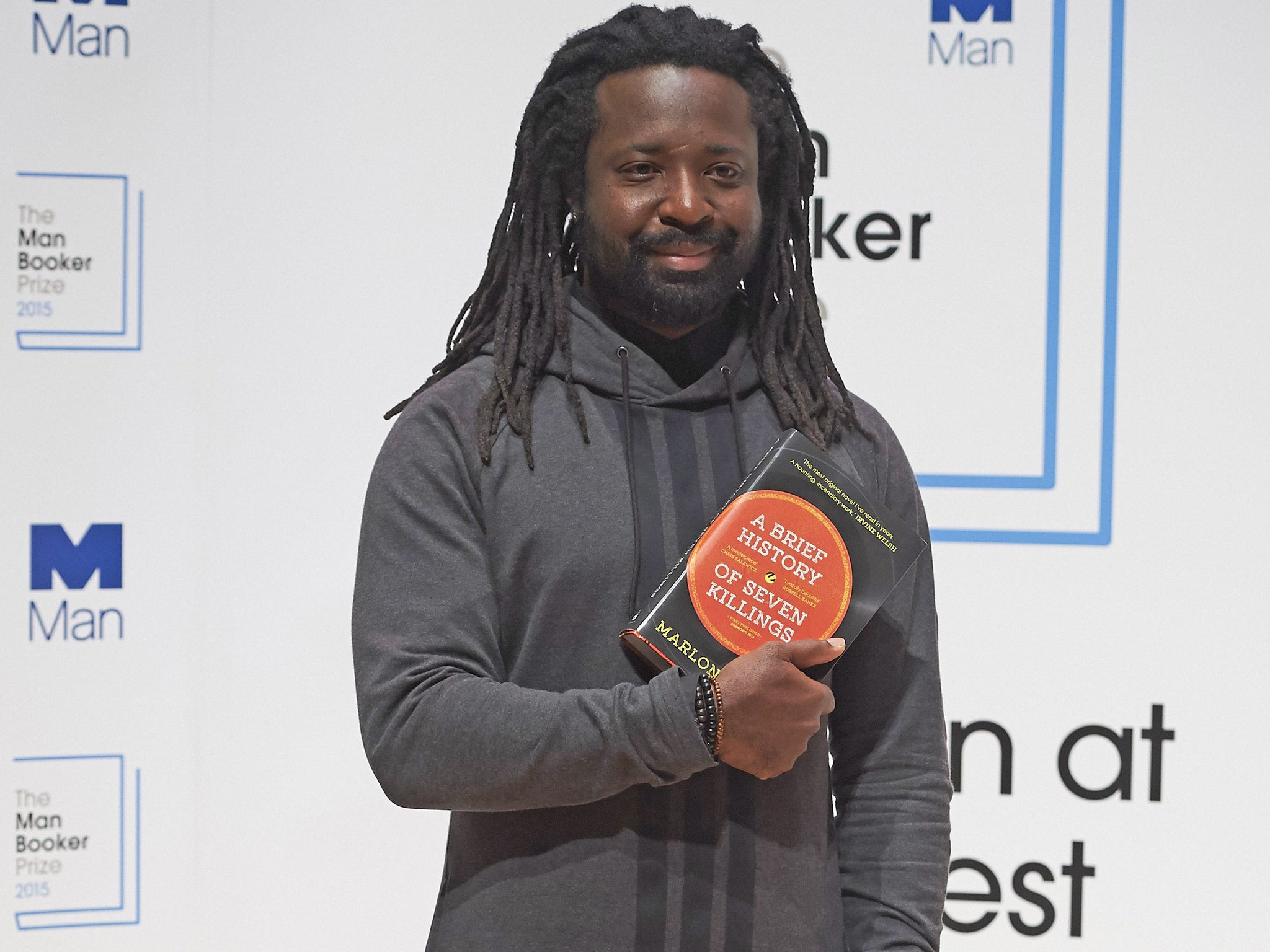Man Booker Prize 2015: Marlon James becomes first Jamaican to win award with A Brief History of Seven Killings
The 'extraordinary' 686-page epic has been likened to a Quentin Tarantino film because of its violence and swearing

Your support helps us to tell the story
From reproductive rights to climate change to Big Tech, The Independent is on the ground when the story is developing. Whether it's investigating the financials of Elon Musk's pro-Trump PAC or producing our latest documentary, 'The A Word', which shines a light on the American women fighting for reproductive rights, we know how important it is to parse out the facts from the messaging.
At such a critical moment in US history, we need reporters on the ground. Your donation allows us to keep sending journalists to speak to both sides of the story.
The Independent is trusted by Americans across the entire political spectrum. And unlike many other quality news outlets, we choose not to lock Americans out of our reporting and analysis with paywalls. We believe quality journalism should be available to everyone, paid for by those who can afford it.
Your support makes all the difference.A violent thriller partly written in patois about the assassination attempt on Bob Marley has won the Man Booker Prize, with author Marlon James becoming the first Jamaican to win the leading literary award.
The Duchess of Cornwall presented Mr James with a trophy and a cheque for £50,000 for his third novel A Brief History of Seven Killings – which has been likened to a Quentin Tarantino film because of its violence and language – in a ceremony at London’s Guildhall.
Mr Jones revealed his first novel John Crow’s Devil was rejected over 70 times more than a decade ago before it was eventually published in 2005, and he almost gave up writing.
This made the award even better. “It did feel really sweet,” he said. “It is kind of affirming; this is the riskiest novel I’ve ever written.”
On becoming the first Jamaican winner of the prize, he said: “Jamaica has a really rich literary tradition; it’s kind of surreal I’m the first, I really hope I’m not the last. I don’t think I will be. There’s a real universe of spunky creativity that’s happening.”
Michael Wood, chair of the judges, said the 686-page epic was “extraordinary” although he admitted the subject matter could make it a controversial choice. “It’s very violent, full of swearing,” he said, adding: “It’s also full of surprises.”
The judges had little difficulty in making their decision, taking less than two hours to come to a unanimous conclusion. Professor Wood hailed the novel saying: “There’s an excitement right from the beginning.”
One of the judges likes to give the Booker Prize-winning novel to their mother but “this one might be a bit difficult,” Professor Wood admitted adding “it might be good for” those who initially were not interested in reading it. He said his own mother would not have got through the first few pages “because of the swearing”.
On 3 December 1976, seven men from West Kingston stormed Marley’s house with machine guns, but the musician survived. The events inspired Mr James to write an “imagined oral biography” of the events and aftermath.
“It is a crime novel that moves beyond the world of crime and takes us deep into a recent history we know far too little about,” Professor Wood said. “It moves at terrific pace and will come to be seen as a classic of our times.” While Marley is only ever referred to as “The Singer” throughout the novel, it tells a fictionalised version of the near assassination through characters from FBI agents, to killers, ghosts and even Keith Richards’ drug dealer.
Some parts are written in Jamaican patois and one of the Booker judges consulted a Jamaican poet “to see what his ear was like. He said [James’s] ear was spot on.”
The 44-year-old author, who cites Dickens as a major influence on his work, was born in Kingston and left Jamaica for the US in 2007.
He listened to Marley’s album Exodus, the album recorded after the assassination attempt, while writing the book as he wanted the musician’s viewpoint to inform the work.
Mr James overcame the odds beating bookies’ favourite Hanya Yanagihara, the US writer whose 736-page novel A Little Life explored themes of child abuse and self-harm.
While Seven Killings is violent, Professor Wood said there was “a liveliness in the wit of the writing that’s a little more cheery than a few of the other books [on the shortlist]”.
Also on the shortlist were British authors Sunjeev Sahota and Tom McCarthy and Chigozie Obioma, the 28-year-old Nigerian author nominated for his debut work.
This year marked the second that any author writing in English – rather than just from the Commonwealth – was eligible for the prize. Critics feared the rule change would leave the prizbe swamped with authors from the US. While alongside Ms Yanagihara, Anne Tyler made the shortlist this year, no American has won the prize.
Last year’s winner was the Australian writer Richard Flanagan with his novel The Narrow Road to the Deep North inspired by his father’s experiences on the Burma death railway.
Reviews round-up: 'An epic novel’
“It showcases the extraordinary capabilities of a writer whose importance can scarcely be questioned.”
The Independent
“It’s Like a Tarantino remake of The Harder They Come, but with a soundtrack by Bob Marley and a script by Oliver Stone and William Faulkner.”
The New York Times
“What James constructed might be called an epic Jamaican novel, but that would be wrong: it’s simply epic.”
The LA Times
“Not for the faint-hearted.”
The Irish Times
“Above all, James has triumphed in capturing the tension, the politics, the heat, chaos, beauty and music of Jamaica.”
The FT
Join our commenting forum
Join thought-provoking conversations, follow other Independent readers and see their replies
Comments